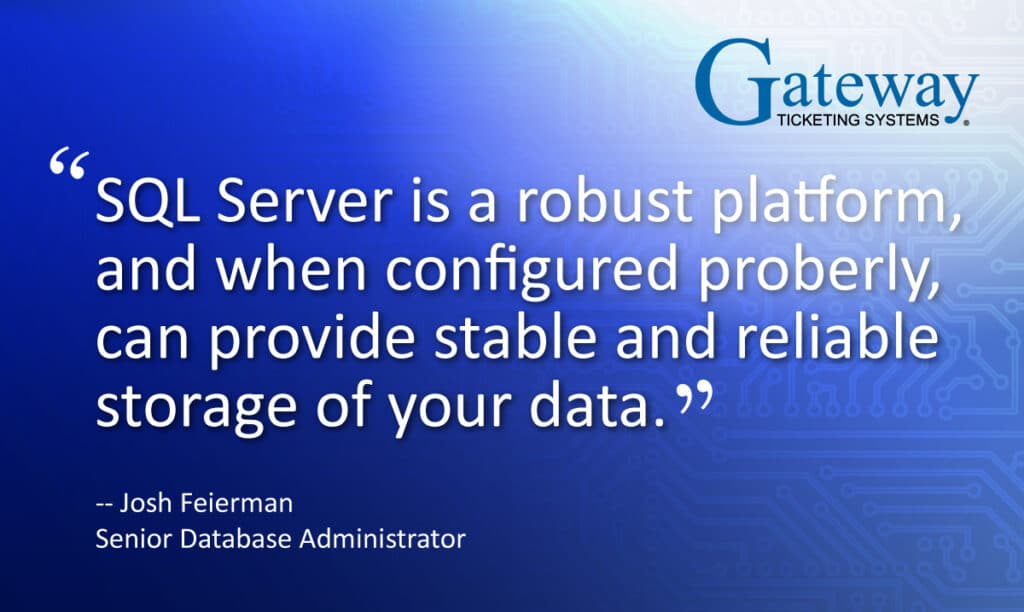Products & Services
From the industry's best ticketing system to unified food & beverage and retail operations, Gateway offers world-class solutions to increase revenue.

Throughout your business, there are assets that are critical in keeping things running smoothly. From the turnstiles that ensure smooth entry and exit from your facilities, to the people who greet your guests, to the exhibits and features that draw your crowds.
Each of these has a role to play, and an important one. But if we step back and think about it, there really is an asset that is far and away the single most valuable part of your business: data.
Without data, your business cannot run. Just stop for a moment, and consider all the parts of your attraction that require access to data from your ticketing system.
This is why when I work with customers, my first priority is to make sure that their data is safe. I can’t help it really; it’s in my blood as a DBA. I remember once how impressed I was when a candidate I was interviewing responded to my question of “What is the role of a DBA?” with this: “Simple: protect the data.”
And yet, I see so often situations where people unknowingly put their most valuable asset at great risk. I’ve seen data that has never been backed up, putting every bit of it in danger. Worse still is when I see cases where folks have the best of intentions and try to set things up properly, but because of some subtle nuance in how SQL Server works, they are at no less risk than those who have done nothing. I’m not exaggerating when I say it breaks my heart, because I have also witnessed firsthand the impact when customers lose the thing that is most precious to them.

It’s 8 p.m. on a Saturday, right after a day of record attendance at your facility. You’re just about ready to close up for the night, when suddenly you begin to see problems accessing your data. It might start subtly, with an error message popping up while trying to process a customer’s order over the phone. Quickly, it spreads, and it becomes apparent something has gone majorly wrong.
After some investigation, you find that something has caused the database that houses your system’s data to become corrupted and inaccessible. Why isn’t important. It could be any number of things from a power surge to simple hardware failure. What is important is this: you are now, for all intents, unable to complete the core processes of your business.
But worse still is what you find out shortly thereafter. Because of a misconfiguration, your data has not been backed up in days. Because alerts were not configured, no one was notified, and therefore the problem wasn’t fixed. As a result, you must now face the reality that you will lose days’ worth of data. All the tickets you sold, all the information contained in that data, is gone.
After the data has been restored, you still feel the repercussions for weeks afterwards. Customers who come to your facility find that their tickets will not scan, because there is no record of them in the database. When your accounting department needs to calculate figures for the month, they are missing huge amounts of data and so cannot produce accurate numbers.
This story isn’t meant to scare the customers I tell it to, at least not in any kind of a mean-spirited way. But I make it a powerful one to serve a purpose: vividly illustrate the true potential cost of losing one’s data.

One of the first things I always do with customers is ensure that their data is being backed up in a reliable and consistent manner.
These are all important questions to ask. And yet, we find quite often that we are the first ones to ask them. This is why I truly believe that one of the best services we offer to our customers is that of our expertise and guidance. Our software is the best of the breed, for sure, but software is nothing without the data behind it.
There are few things I enjoy more in my job than helping customers. And I find the feeling is mutual. The customers I have worked with have universally expressed their gratitude and relief after we show them how a few simple changes can make a dramatic difference in ensuring the safety of their system’s data.
Because for the person or people responsible for maintaining this data, their most valuable asset is peace of mind.